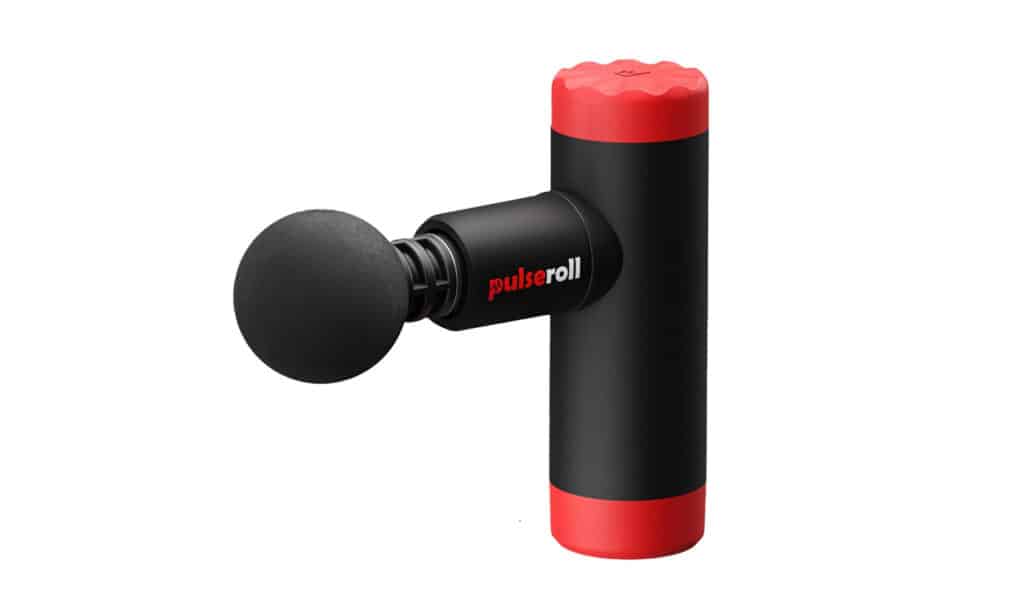
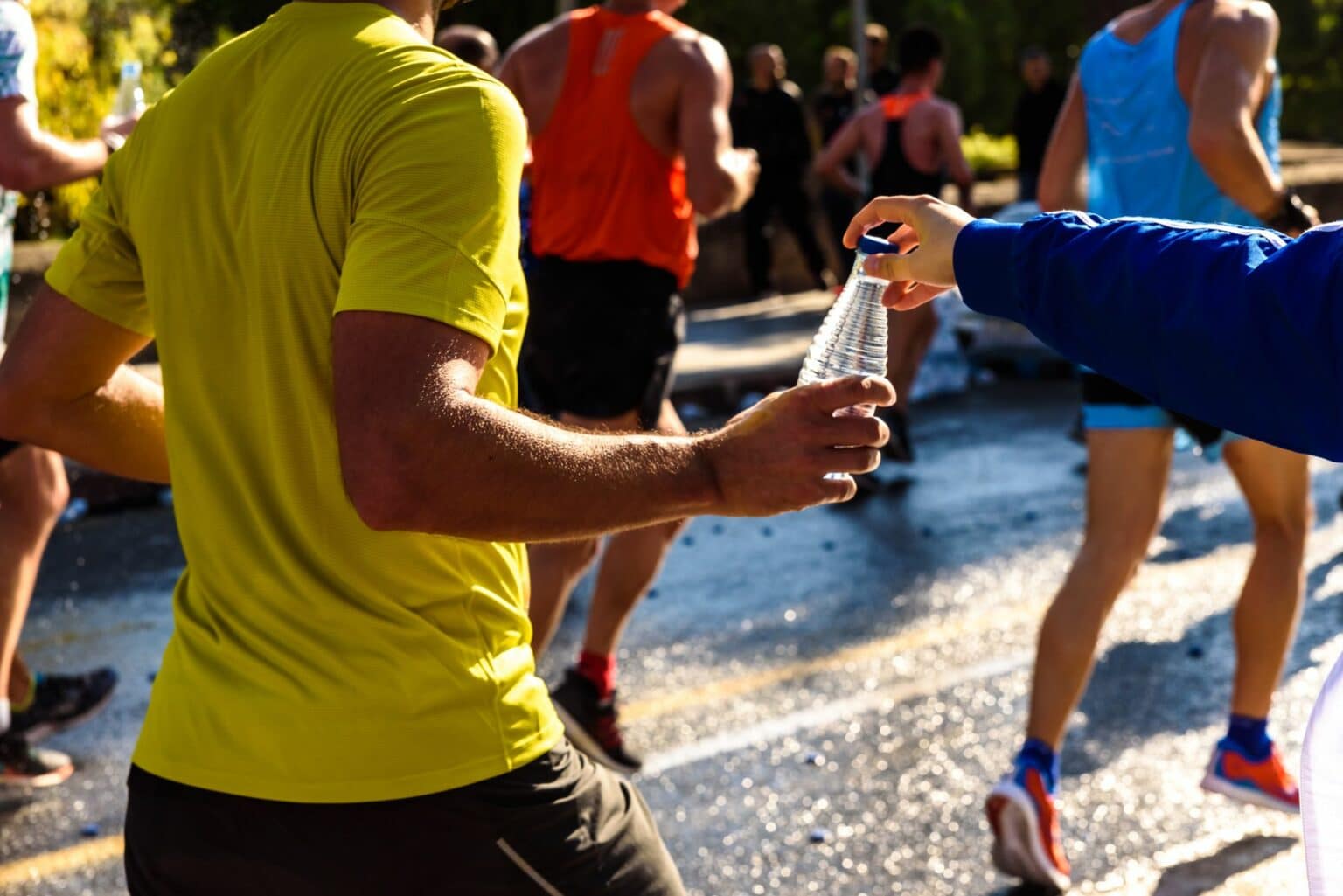
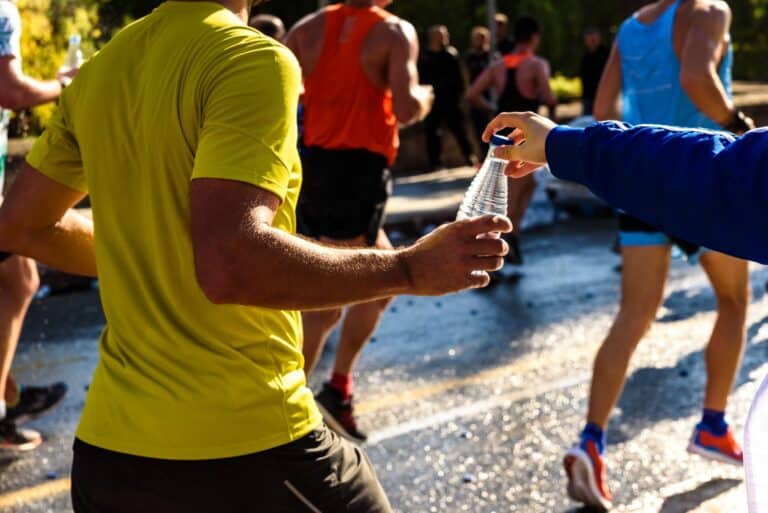
Congratulations, you’ve just completed a marathon!
This is a huge accomplishment and you should be proud of yourself for all the hard work and dedication that went into preparing for this event. However, your post-marathon recovery journey has just begun. Recovery after a marathon is just as important as the training leading up to it.
In this guide, we’ll discuss the top 10 things to do after a marathon for a fast marathon recovery. These tips will help you bounce back from the physical and mental toll of a marathon, so that you can get back to running and training in no time.
While it might seem counterintuitive, staying active post-race is crucial to your post-marathon recovery. After you’ve triumphantly crossed the finish line, resist the urge to collapse! Instead, take a slow walk to collect your medal and other goodies, then engage in some light stretching. It’s vital to remain upright and move around as much as possible. This continued movement not only wards off stiffness and swelling but also boosts circulation.
Similarly, in the days following the event, opt for mild activities like walking, gentle yoga, and regular stretching. Using a foam roller can also help with muscle recovery after a marathon. These activities can improve flexibility, reduce muscle soreness, and promote circulation. Focus on stretching out your legs, hips, and back to target key areas used in running.
Believe us, the more you keep moving, the more your body will thank you for it during your post-marathon recovery.
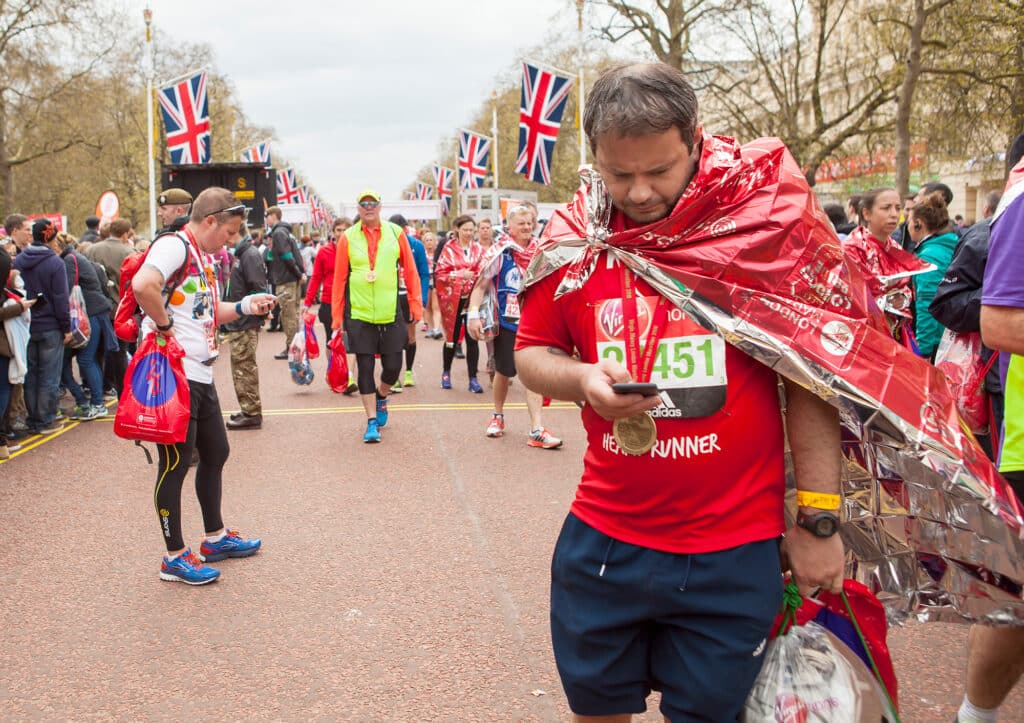
During a marathon, your body loses a significant amount of fluid through sweat. It’s important to replenish these fluids as soon as possible after the race and in the days following to avoid dehydration. Aim to drink at least 16-24 ounces of water or electrolyte-replenishing sports drinks within the first hour after finishing the marathon. This can prevent muscle cramping.
Additionally, feeling sick post-marathon is quite common due to the release of stress hormones and your body’s shock response. It’s crucial to hydrate afterwards but do so gradually with small sips.
Your body also needs nutrients to repair and refuel itself after a gruelling marathon. Make sure to eat a high-carbohydrate, high-protein snack or meal within 30 minutes after crossing the finish line and as part of your marathon recovery. Ideally, you should have planned your initial re-fuel and packed the necessary snacks in your bag. Options such as bananas, energy bars, and peanut butter are excellent choices.
Whether you met your running goals or not, celebrating the significant accomplishment of finishing a marathon is crucial. It’s a monumental achievement!
Take the time to commemorate this milestone with friends and family, and don’t hesitate to broadcast your marathon success across social media.
Completing a marathon is a commendable feat, and you’ve earned the right to revel in your triumph!
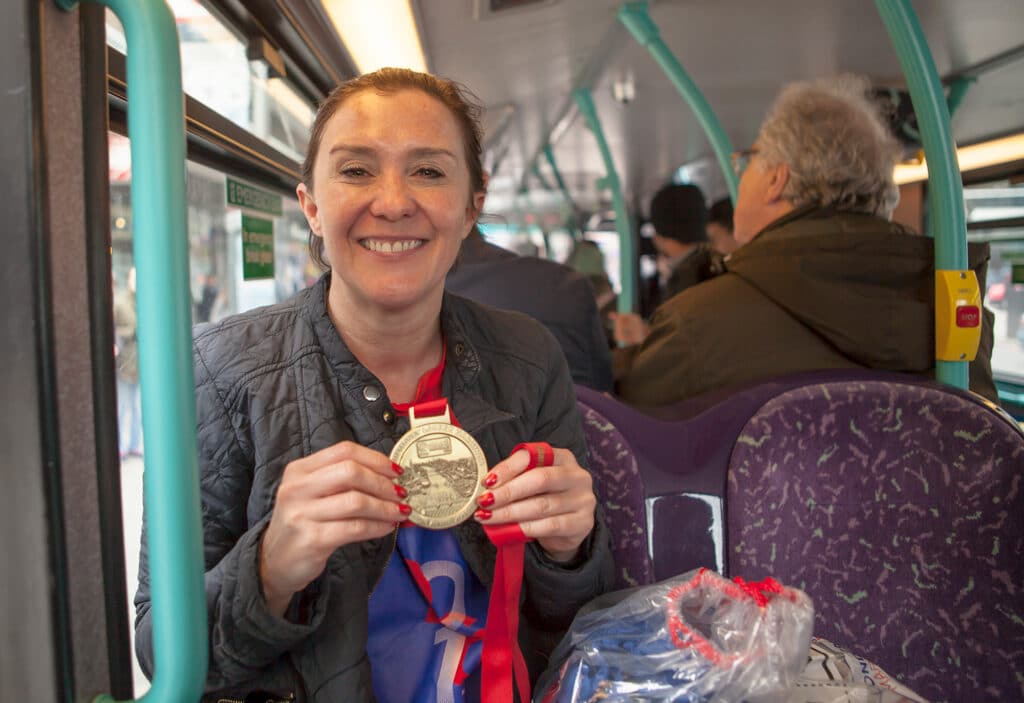
Taking a cold or ice bath as part of your marathon recovery is known as cryotherapy, and it can help reduce swelling and inflammation in your muscles. Fill up your bathtub with cold water and add ice if you can handle it. Sit in the bath for 10-15 minutes to help your muscles recover faster.
If you don’t have access to a bathtub, consider taking an ice bath with frozen water bottles or bags of ice in a small pool or paddling pool.
After putting your body through the intense challenge of a marathon, it’s important to give yourself time to recover and rest. Make sure to get a good night’s sleep and take naps during the day if you need them.
Your body repairs and rebuilds muscle tissue while you sleep, so getting enough rest is crucial for your recovery. Aim for 8-10 hours of sleep per night in the days following the marathon.

Compression gear, like socks or leggings, can also aid in reducing inflammation and swelling after a marathon. They work by promoting blood flow to your muscles, helping them heal faster.
Wearing compression gear during your marathon recovery, whether for a few hours a day or overnight, can help with muscle soreness and fatigue.
A post-marathon massage can also help with muscle recovery by promoting blood flow and reducing inflammation. Make sure to see a certified sports massage therapist who understands how to work specifically on marathon-related soreness and tightness.
If a professional massage isn’t an option, consider using a foam roller, massage gun or self-massage techniques to work out any knots and tension in your muscles.
It’s important to give your body time to rest and recover after running a marathon distance. This means taking a few days off from running and any high-impact activities. Focus on low-intensity exercises like walking, swimming, or yoga to aid recovery.
Listen to your body, and don’t push yourself too hard. Gradually ease back into your training routine when you feel ready.
While taking the time to rest and recover is important, don’t let it turn into a prolonged break from running. It’s essential to keep up your momentum and continue with your training.
After a few days of active recovery, start incorporating easy runs or cross-training into your routine. This will help prevent any loss of fitness and maintain your endurance level for future races.
By following these tips, you’ll be back on the road and ready for your next marathon race day in no time! Keep pushing yourself, stay dedicated, and remember always to prioritise self-care during your recovery process.
Post-marathon recovery is essential because it allows your body to repair muscle damage and restore itself after the intense physical demands of running a marathon. Training for and completing a marathon puts significant stress on your muscles, joints, and cardiovascular system. It’s crucial to give your body time to recover and heal properly to prevent injury and burnout.
Failure to prioritise post-marathon recovery can lead to long-term damage and hinder your future running performance. Taking the time to rest, hydrate, refuel, and engage in active recovery, such as light exercise, will help you bounce back stronger and prepare for your next race. So, make sure to take care of yourself after crossing that finish line!
The post-marathon recovery period varies for marathon runners and can depend on factors such as your training level, age, and overall health. It’s essential to listen to your body and not rush the recovery process.
For most runners, they will start feeling back to normal within a week or two. However, it could take up to several weeks for others to fully recover. Most runners need at least 3-4 weeks of recovery strategy to rest and slowly ease back into a training routine before returning to high-intensity workouts. Remember, adequate recovery is key to preventing injury and maintaining peak performance.
It’s normal to feel worried about losing fitness by taking time off after a marathon. However, it’s essential to give your body adequate rest and recovery time before resuming your training.
Taking a few days off or engaging in low-impact activities such as a swimming-based recovery session won’t significantly impact your overall endurance or fitness level. In fact, proper recovery can prevent overtraining and help you come back stronger for future races.
Just make sure to ease back into your training routine and listen to your body’s cues. Don’t push yourself too hard, and trust that your body will regain its endurance and rebuild its immune system over time with consistent training. Remember, rest is just as important as training when it comes to improving performance. So, don’t be afraid to take a break and prioritise your recovery. Your body will thank you!
It’s recommended that the post-marathon recovery period should be at least 1-2 weeks of rest. This includes avoiding any high-impact activities like running and focusing on low-intensity exercises.
However, the recovery time may vary for each individual, so it’s essential to listen to your body and give yourself as much time as you need.
After a few weeks of active recovery, gradually start incorporating running back into your routine. It’s crucial to ease back into training and not push yourself too hard, as this can lead to burnout or injury. Remember that proper rest and recovery are crucial for long-term success in distance running.
After completing a marathon, it’s important to take care of your body both physically and mentally. By staying active, hydrating, and nourishing your body with nutritious food, you can promote a faster recovery. Additionally, incorporating methods such as cryotherapy, compression gear, and massages can also aid in muscle recovery.
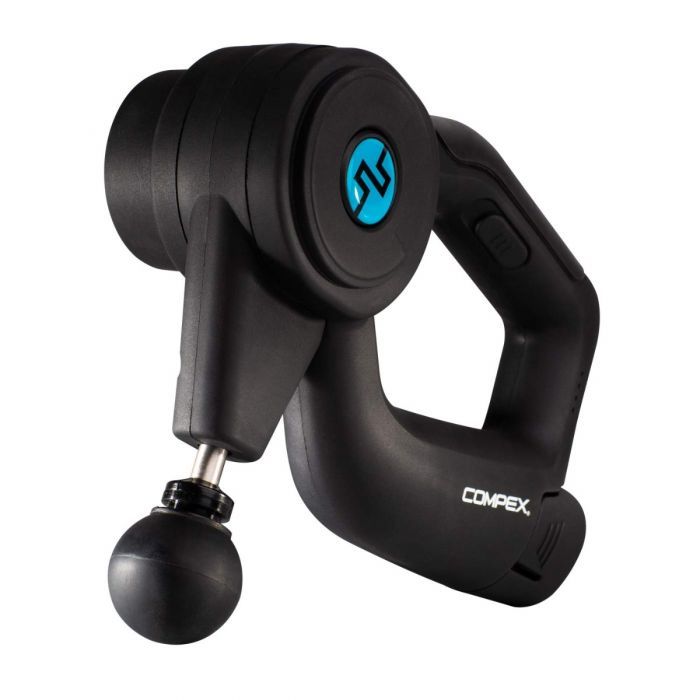
Investing in a massage gun such as Compex Fixx (from £199 on Decathlon) or a Urban Fitness Foam Roller (from £65 on Decathlon), is another option to consider, as it offers a convenient way to target specific areas of delayed onset muscle soreness and tension. Just remember for the first few days after a marathon, your muscles will be very tender, so go easy on the massage gun speed and test sore areas on a very low setting.
A massage gun can also be used regularly for maintenance and to prevent sore muscles, tightness, and injury during running training.
Give your body the care it deserves, and keep on running. With proper rest and recovery, you can continue to push your limits and achieve even more outstanding feats. Congratulations on completing your marathon and keep up the great work!
Ready for a speedy marathon challenge? Take a read of our 4 hour pace marathon blog.
Share this article
Introduction – What is the Lydiard Method? The Lydiard Method is a periodised training system...
Hi Mike, this year, I ran two half marathons (1:45 and 1:38) and a full...
Pronation refers to the way your foot rolls inward when you walk or run. Understanding...
Introduction Run Less Run Faster is a scientifically-backed training method that allows experienced runners to...
Hi Mike, the 4-hour mark feels like both a mental and physical barrier. What strategies...
Hi Mike, I’m 43 and have run four marathons, with my most recent finish being...
We’re here to make sure you’re up-to-date with the latest running tips, events and product discounts – we’ve always got your back! Rest assured, we value your privacy and would never dream of selling your address.
BONUS: Sign up today and receive a FREE code for our Sub-4-Hour Marathon Plan
Your privacy settings
Manage Consent Preferences
Necessary
Analytics
Embedded Videos
Marketing
Facebook Advanced Matching
Facebook CAPI